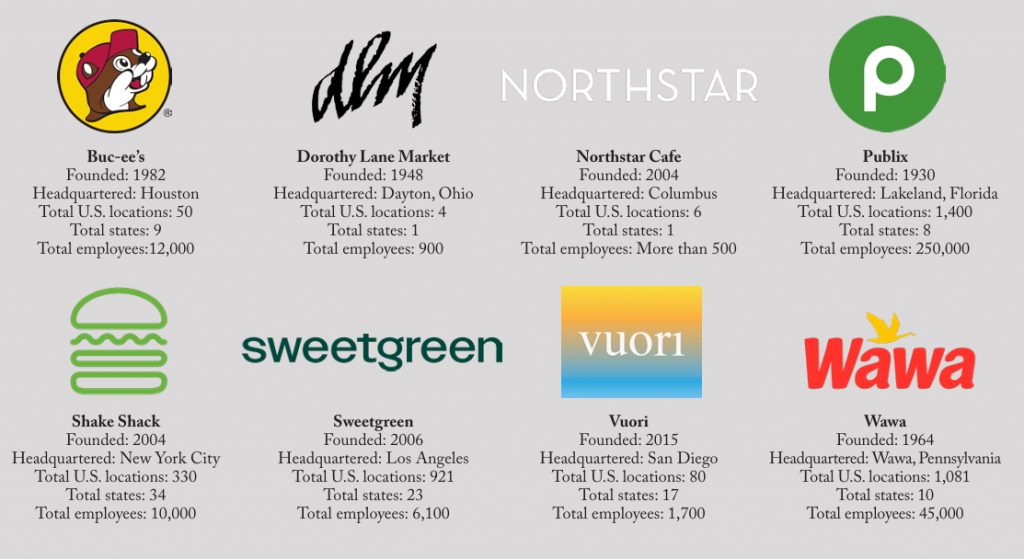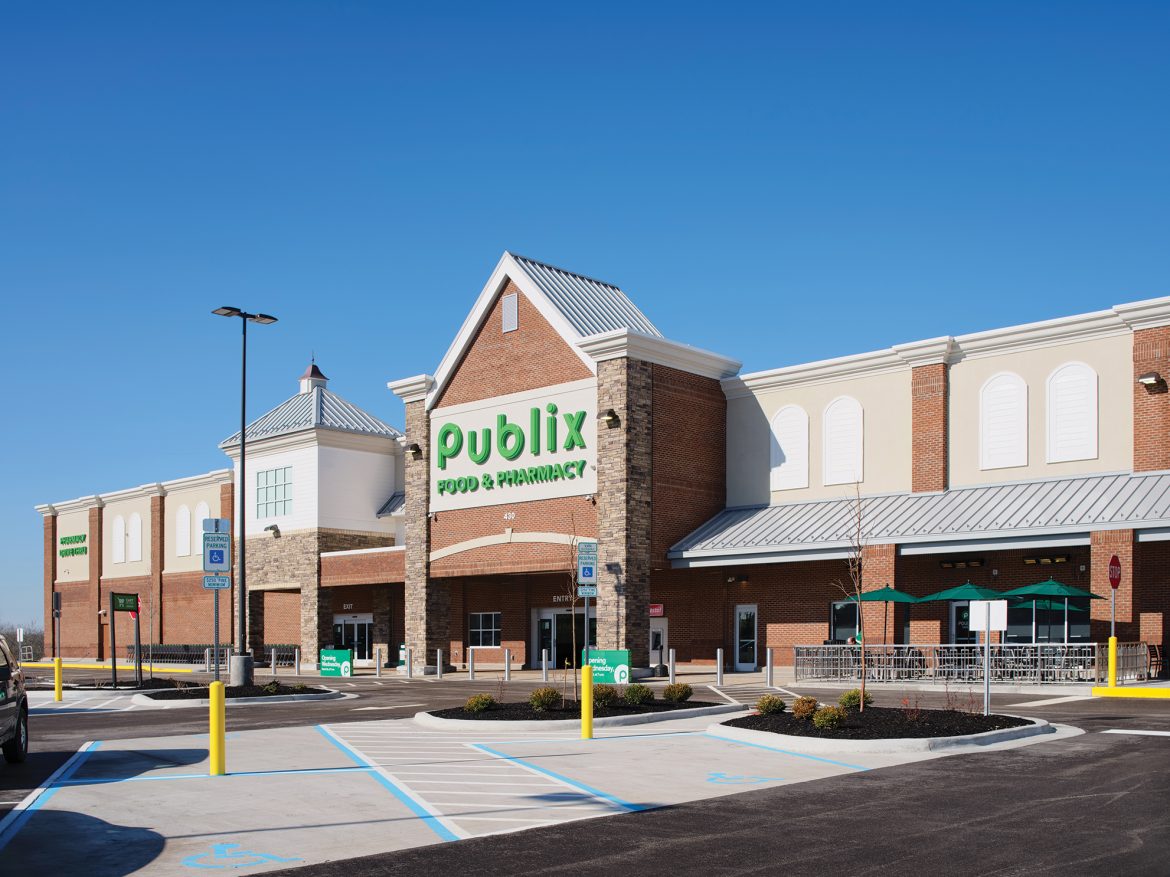So far in 2025, the U.S. economy has mostly avoided the recession threats looming since the pandemic’s onset five years ago rocked supply chains and upended business around the world. The typical indicators of economic health continue to hold steady: Unemployment has hovered around 4 percent since last year, and the inflation rate remains largely unchanged at 2.8 percent as of February, according to the Bureau of Labor Statistics.
Companies always adjust accordingly, including dealing with the uncertainty around President Trump’s tariff plans. In the retail and food/hospitality sectors, many brands are pushing ahead with plans to expand into new markets—which has resulted in a confluence of regional and national brands coming to the Cincinnati region for the first time.
From an upscale athleisure company to restaurants to a growing grocery chain, national brands are staking their claim in our regional market in 2025. Sweetgreen, Publix, Vuori, Shake Shack, Wawa, and Buc-ee’s are all set to open this year or have recently opened stores in this region, and that’s good news for area consumers.
“Added competition can drive down costs as existing retailers step up their game to retain market share,” says Kim Busdieker, assistant marketing professor at the University of Cincinnati. “There is also added variety and potentially new-to-market products that were previously available in limited channels, making it more convenient for local consumers.”
Take Vuori, for example. Founded in 2015, the brand has carved out a high-profile position among similarly elevated activewear brands like Lululemon and Alo Yoga and skyrocketed in popularity, attaining a valuation of $5.5 billion in November 2024. While Vuori products are available in other stores such as REI, none of its 80 stand-alone retail locations are in Ohio. A new storefront going into the Kenwood Towne Centre will be the first.
“It’s your typical inline store toward the end of the mall where our luxury brands are,” says David Jacoby, general manager of Kenwood Towne Centre, which is managed by Brookfield Properties.
While many malls in the Cincinnati region and across the country are struggling, Kenwood continues to thrive. There are more than 180 specialty shops on site, including kiosks and designated storefronts. Vuori is moving into the 3,381-square-foot space currently occupied by Ticknor’s, a men’s clothing store, which is relocating to another storefront in the mall.
“We have brands here that are first to market, sometimes first to state, and nobody else has them in the area,” says Jacoby. “Our leasing folks look at what we have and the consumer demographics we want to attract, and the reality is we attract every demo graphic. We have everything from your typical mall retailer all the way to the luxury brands and everything in between.”
When a brand decides to set up shop in a new location like Kenwood Towne Centre, co-tenants are an important component of the equation. Vuori, for example, will be next to the existing Alo Yoga store. Shoppers respond well when a variety of brands they want to visit are clustered together, Jacoby says.
“If we know that there’s a particular service or retailer that’s wanted or needed here, we’ll go after them and obviously put them in the mix,” he says. “We want the variety of retailers here to make sure we continue to serve everybody that we can. ‘Something for everyone’ is kind of our motto. We want to make sure that everyone has a place to visit here.”
At Kenwood, the timeline from lease to opening for a retailer like Vuori that’s moving into an existing storefront typically ranges from two to five months. The Vuori store is scheduled to open later this year, while two new restaurants are opening in April: Northstar Cafe, based in Columbus, and the Cincinnati-based Mexican chain Mi Cozumel.
[Photograph of new Publix store in Walton by Chris von Holle]

Another new-to-market brand setting up its first shop in the region later this year is Sweetgreen (pictured above). The fast-casual chain was founded in Washington, D.C. in 2006, with an emphasis on healthy food that serves primarily salads and warm bowls. All of its 900-plus stores are company-owned, meaning there are no franchise locations.
Focusing on “fresh, plant-forward, earth-friendly food,” its primary competitors in town will be Chipotle and Currito—familiar rivals in other markets as well. Sweetgreen plans to expand throughout the state, and its second location is coming to Liberty Center in Butler County, which also hosts the region’s first Northstar Café. (See “Give Us More Liberty” in this issue.)
In general, Liberty Township is seeing a wave of first-to-market brands moving in, due in no small part to its growing population (43,999 according to the 2020 U.S. Census) and plentiful real estate. “The suburbs have become much more densely populated,” says UC’s Busdieker. “There’s a lot of expendable income there.”
Fellow Liberty Center tenant Shake Shack is also expanding, with a second location opening across from the University of Cincinnati campus in Clifton Heights. The new shop occupies space left vacant by former U Square tenant Keystone Bar and Grill and will be the brand’s ninth Ohio location.
“When brands come into university areas, they’re going to very much look at what types of products will get store traffic and visits and that students can afford,” says Busdieker. “If their prices are good, their food is great, and the people are nice, when they’ve got those three things and it’s still within their budget, students will flock to it.”
Wawa, the Philadelphia-based gas station and convenience store with a cult following for its hoagies (sub sandwiches), opens its first Ohio location April 16 at 7198 Cincinnati Dayton Road in Liberty Township. The company calls April 16 Wawa Day—it’s the date the first company location opened in 1964.
This store also marks the company’s spread into the Midwest. Wawa projects opening eight to 10 locations in Ohio in 2025, with a robust plan to build and open six to 10 stores per year and eventually operate 60 stores in the state. Wawa is investing more than $7.5 million to build each store and will utilize 140 contractors and local partners on average. Each store will employ an average of 35 associates, and Wawa expects to create 2,100 new, long-term jobs through its expansion into Ohio.
There’s something to be said for the power of the cult of personality, too. Buc-ee’s, the Texas-based gas station chain with a massively devoted fan base, opened its first two Kentucky locations last year in Richmond and north of Bowling Green, and the first store in this region is coming to the Dayton area.
“It’s really an aff ordable luxury in a time when consumers feel like they don’t have as much money to spend,” says Busdieker. “Both Wawa and Buc-ee’s tap into that contact with fuel. For some reason there’s a psychological positive association with fuel and saving money. Then you go inside Buc-ee’s and there’s merchandise, it’s fun, people are excited, they’ve got T-shirts, and they’re known for their jerky. It’s like a big experience to go in there at a time when people feel like, I can’t do some other things, so I’ll go do this.”
Buc-ee’s first Ohio location was slated to open in Huber Heights later this year, but the opening has now been delayed until 2026. In the meantime, fans will need to drive south for their brand fix.

Restaurant and gas/convenience store combos aren’t the only new kids on Cincinnati’s retail block. The grocery store sector added a new player, too, when Publix opened its first regional location in Walton in March.
Th e 95-year-old grocery chain was founded in Florida during the Great Depression and has steadily increased its presence across the Southeast, with stores in Georgia, Alabama, South Carolina, North Carolina, Virginia, Tennessee, and now Kentucky. It’s the largest employee-owned company in the country, with 255,000 associates.
“We’re owners of this company and we take pride in its success,” says Jared Glover, Publix media relations manager covering Kentucky, Virginia, North Carolina, and South Carolina. “I could go on and on about our Pub subs and our high-quality produce and signature private-label items, but for me the biggest differentiator is because we’re owners of this company and we care about its success—so our associates go beyond the status quo to provide premier customer service. I think that’s something that you’re going to hear about as we open our stores just as much as you hear about our food.”
The first Publix in Kentucky opened in Louisville in 2024. Another 11 locations in the state have been announced, including stores in Hebron, Cold Spring, Florence, and Independence. Publix enters a grocery region dominated by homegrown juggernaut Kroger, which achieved more than a 50 percent market share in the region last year.
“It used to be that you would never compete in the backyard of someone’s corporate offices, but the shopping experience is shifting so much these days,” says Busdieker. “Th ere are so many retailers that are actually thriving and dividing those sales, Publix feels like they’ve got an opportunity to come in and peel off some of that share in Cincinnati.”
Glover agrees. “Competition isn’t new to us,” he says. “Competition is good for everyone, right? It’s going to make everyone better, and the customers are really the ones who are going to benefit from that the most. We’re going to put our best foot forward to get you in the door and keep you coming back.”
Publix doesn’t disclose the strategy it used for seeking out and securing new locations in new markets, but community discussions, requests, and proximity all played a part in the Kentucky equation. “We just opened up a distribution center in Greensboro, North Carolina, which helped us support other stores in the area and alleviate some of the pressures a little bit,” says Glover. “It really provided us with an entry into Kentucky and opening up that first store in Louisville. We’d been getting a number of requests for our stores, particularly in Kentucky, and so Lexington was on the map.”
The Citation Point location in Lexington opened March 5, just a few weeks before Walton. Two other locations are planned in Lexington, including one at Th e Fountains at Palomar currently under construction. “We’re really focused on getting those customers into the doors and letting them experience the Publix diff erence,” says Glover.
The Walton Publix is 55,000 square feet, designed with wide aisles and bright lighting for customer convenience. The location follows a new store format that includes a “pours” section with beer and wine on tap, smoothies and acai bowls, and a café with cold brew coff ee and tea. A “venues” area in the center of the store offers multiple food options, including a burrito bar, pizza, and sushi. The famous
“Pub subs” can be customized to a consumer’s exact taste; shoppers can even pull an item off the shelf at Publix and ask to have it incorporated into their sub.
“It’s really about being in the store and experiencing the hospitality of our associates and them going above and beyond to get you what you need,” says Glover. “The sale’s not complete until you’re satisfied. A longstanding saying we have is, We’re in the people business and we happen to sell groceries. That’s who we are at the core, and that’s what sets us apart. So when customers experience that, maybe we’ll chip away at that market share one customer at a time, one sale at a time, and they’ll come back.”
Publix also endeavors to practice good corporate responsibility through partnerships with local organizations and businesses that align with four pillars: youth, education, hunger, and the plight of the homeless. The company participates in food donation programs, including Feeding America food banks, to which they’ve donated over a billion pounds of produce. There is a Public Service Week in April that sends associates out into state parks and other areas to clean up the environment.
“It extends beyond the stores for us,” says Glover. “Before we even entered Kentucky, when we were just sort of boots on the ground scouting locations, we were already making donations to food banks in that area, trying to take care of our soon to be neighbors and customers in need.”
Several regional brands are getting in on the action, too. The Dayton-based Dorothy Lane Market gourmet grocery chain is opening its first Cincinnati area store in Mason later this year. Columbus-based Northstar Cafe, coming to Kenwood in April, opened its first area location at Liberty Center.
“It builds a sense of excitement for a town that can attract incremental retailers from a variety of categories,” says Busdieker. “As more customers come to shop from increasing distances, new retailers see the value in entering a market where foot traffic and interest is growing.”


